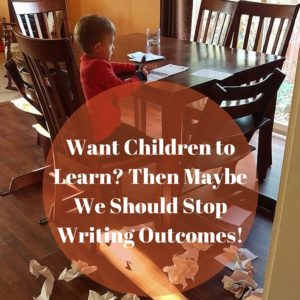 Here’s the long and the short of it…I’m struggling to see any reason to continue identifying and writing learning outcomes for young children.
Here’s the long and the short of it…I’m struggling to see any reason to continue identifying and writing learning outcomes for young children.
Oh, and by the way, if you think I mean just learning objectives found in general education lesson plans (or in other ways “made visible” due to one K-12 policy or another), you’d be wrong.
I, also, mean identifying and writing Individualized Education Plan (IEP) goals and Individualized Family Service Plan (IFSP) child/family outcomes.
Now, before you push back (or say “amen”)…hear me out.
I’m not saying we should do away with planning, I’m not saying we should move away from being intentional and individualized, and I’m not saying that lesson plans, IEPs, and IFSPs are a complete waste of time.
What I’m saying is that we need a new approach…a {r}evolution regarding why, when, and how we think about outcomes…particularly as it applies to early development and learning for children with diverse abilities.
For those who don’t know me…trust me when I say I have A LOT of experience when it comes to this topic. In fact, I’ve been researching and training others on how to write IFSP outcomes, IEP goals, and how to identify “what” to teach, as part of tiered instruction, for decades. I’ve done this with the hope, the desire, and the intent, that the result would be improved “outcomes” for young children and their families.
What I see instead, however, is an emphasis on the form and procedures (i.e., how to complete, how many to target, where they are posted), and not enough emphasis on understanding the function of the outcome, or how best to accomplish what has been set as the outcome.
For me, the catch is…I’m no longer convinced that time spent identifying, writing, and then posting outcomes of one type or another, leads to better instruction (i.e., I don’t see how it leads to individualization and differentiation). What we want is to see a positive change in the lives of children and their families, not the completion of paperwork that meets some arbitrary requirement of being “right.”
I’m not even convinced, that outcomes serve as a useful guide for instruction in early childhood programs. Are you? Do we have substantial evidence that what we write/post/list is what we teach? What children learn? My research and experience suggests the answer is, no.
But, before you decide if you agree or disagree, let’s acknowledge a few things…
- The issues around outcomes are more complex than can be addressed in a single blog.
- The answer is likely to be found in options that are both/and versus either/or.
- Early childhood is a unique period in development and deserves unique policies and practices.
- We can admire the problem, or {r}evolutionize how we identify and write outcomes.
For me…I still struggle with the whole idea of giving up on identifying and writing outcomes; however, my own reflection and reading of the literature tells me there is a need for a change. We have to begin to do things differently in early childhood education. So, why not begin with changing how we think about outcomes?
Here are a few specific practices I encourage you to consider, debate, explore, and test out. You know…the necessary actions of any effective and thoughtful {r}evolutionary.
- Use your time to assess why something is occurring versus trying to determine what has or should occur. In other words, play detective and figure out the barriers to a child’s development and learning versus making lists and check marks regarding mastery or lack of mastery, particularly regarding discrete or less than representative skills.
- Keep assessment and progress monitoring activities linked to instruction, versus becoming the instruction. Well…unless assessment and progress monitoring activities are authentic, holistic, and play-based, then they can be synonyms. Many of you know one of my mantras, which is assessment, instruction, and play are all the same. However, this is only possible if all three are developmentally and individually relevant, engaging, supportive, and well…play-based.
- Avoid rushing and pushing children to develop and/or learn faster. Rather, think more about where they are, how to strengthen existing skills, how to help them generalize, and how to introduce challenges and variability that ignite curiosity, not frustration and boredom. In other words, open doors to development and learning, don’t create additional barriers.
- Ensure a clear understanding of the various sequences that impact early development and learning, including those sequences that are developmental, pedagogical, and logical. Also, be aware of the inter-relatedness within and between development and subject areas. How we divide children’s development and learning, often doesn’t make sense given that they are an integrated whole – a system that works in unison not in compartments.
Once we have had conversations around such practices, then we might be ready to identify and/or write outcomes…or perhaps, we’ll find a better way to address needs and ensure that all children thrive.
What do you think? Ready to give up on how we currently identify and write outcomes for young children? If so, what evidence supports your stand and how will you begin to make a change in practice?
 “The failure of early childhood education in America is that it has failed to educate.“
“The failure of early childhood education in America is that it has failed to educate.“